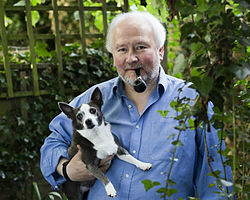Andrew Linzey (born 2 February 1952) is an English Anglican priest, theologian, and prominent figure in Christian vegetarianism. He is a member of the Faculty of Theology at the University of Oxford, and held the world's first academic post in Ethics, Theology and Animal Welfare, the Bede Jarret Senior Research Fellowship at Blackfriars Hall.
|
Andrew Linzey
| |
|---|---|
 | |
| Born | (1952-02-02) 2 February 1952 (age 72) |
| Children | Clair Linzey |
| Ecclesiastical career | |
| Religion | Christianity (Anglican) |
| Church | Church of England |
| Ordained | 1975[2] |
| Academic background | |
| Alma mater | King's College, London |
| Thesis | The neglected creature: the doctrine of the non-human and its relationship with the human in the thought of Karl Barth (1986) |
| Doctoral advisor | Colin Gunton |
| Influences |
|
| Academic work | |
| Discipline | Theology |
| Sub-discipline | Animal ethics, Christian ethics |
| School or tradition |
|
| Institutions |
|
Linzey is the founder and director of the Oxford Centre for Animal Ethics, an independent academic centre opened in November 2006 to promote the study and discussion of animal ethics.[6] He is the author of a number of books on animal rights, including Animal Rights: A Christian Perspective (1976), Christianity and the Rights of Animals (1987), Animal Theology (1994), and Why Animal Suffering Matters: Philosophy, Theology, and Practical Ethics (2009). He is also the editor of an academic journal, the Journal of Animal Ethics, which is published jointly by the Oxford Centre and the University of Illinois,[7] and a series editor with his daughter Clair Linzey, previously with Priscilla Cohn, of the Palgrave Macmillan Animal Ethics Series.[8]
Linzey has written more than 180 articles, and authored or edited twenty books on theology and ethics. He has lectured and broadcast extensively in Europe and the United States. His Animal Theology has been translated into Italian, Spanish, Japanese, and French.
He is most often quoted as saying
Animals are God's creatures, not human property, nor utilities, nor resources, nor commodities, but precious beings in God's sight. ... Christians whose eyes are fixed on the awfulness of crucifixion are in a special position to understand the awfulness of innocent suffering. The Cross of Christ is God's absolute identification with the weak, the powerless, and the vulnerable, but most of all with unprotected, undefended, innocent suffering.[9]
He also said "Christians haven't got much further than thinking that the whole world was made for us, with the result that animals are only seen in an instrumental way as objects, machines, tools, and commodities, rather than fellow creatures",[10] and it is claimed that he "wants to see animal abusers placed on a register and forbidden from keeping an animal, or working with them."[11]
In 1990, he was awarded the Peaceable Kingdom Medal for outstanding work in the field of theology and animals.[12] In June 2001, he was awarded a Doctor of Divinity degree by George Carey, Archbishop of Canterbury, in recognition of his "unique and massive pioneering work in the area of the theology of creation with particular reference to the rights and welfare of God’s sentient creatures". This is the highest award that the Archbishop can bestow on a theologian and the first time it has been awarded for work involving animals. In 2006, in recognition of his role in the creation of the Oxford Centre for Animal Ethics, Linzey was named the Henry Bergh Professor of Animal Ethics at the Graduate Theological Foundation in the US, the first such professorship of its kind in the world.